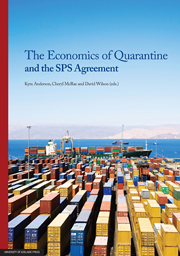Book contents
- Frontmatter
- Contents
- List of tables, figures and boxes
- Acronyms
- Preface
- List of contributors
- 1 Introduction
- PART I The multilateral rules under WTO
- PART II The ‘appropriate level of protection’
- PART III Adding more economics to risk analysis
- 11 Least trade-restrictive SPS policies: an analytic framework is there but questions remain
- 12 Quarantine decision making in Australia
- 13 Quarantine reform: Australia's recent experience
- 14 Evaluating economic consequences of livestock diseases: a US perspective
- PART IV Specific health and environmental risks from trade
- PART V Conclusion
- APPENDIX The legal text of the SPS Agreement
12 - Quarantine decision making in Australia
from PART III - Adding more economics to risk analysis
Published online by Cambridge University Press: 05 June 2013
- Frontmatter
- Contents
- List of tables, figures and boxes
- Acronyms
- Preface
- List of contributors
- 1 Introduction
- PART I The multilateral rules under WTO
- PART II The ‘appropriate level of protection’
- PART III Adding more economics to risk analysis
- 11 Least trade-restrictive SPS policies: an analytic framework is there but questions remain
- 12 Quarantine decision making in Australia
- 13 Quarantine reform: Australia's recent experience
- 14 Evaluating economic consequences of livestock diseases: a US perspective
- PART IV Specific health and environmental risks from trade
- PART V Conclusion
- APPENDIX The legal text of the SPS Agreement
Summary
A fundamental economic question about the Australian Government's decision-making process governing the import of animals, plants and their products is posed in this chapter. Does the process generate measures that not only reduce quarantine risk but are also consistent with the best possible use of Australia's resources? In other words, is Australia as a whole getting value for money from import decisions?
The chapter looks at import risk analysis (IRA) – the analytical tool that underpins quarantine decisions – as well as cost/benefit analysis (CBA) – an analytical tool of economists. It then examines the scope for incorporating CBA in import decision-making under the WTO Agreement on the Application of Sanitary and Phytosanitary Measures (SPS Agreement). The determination of the acceptable level of risk, and of risk conservatism.
Import risk analysis
The decision-making process that currently applies to requests to import animals, plants and their products is illustrated in Figure 12.1. It is administered by Biosecurity Australia within the Department of Agriculture, Fisheries and Forestry – Australia (AFFA). (Until recently, the Australian Quarantine and Inspection Service (AQIS) was the administrating agency.) It distinguishes between routine and non-routine matters, involves the establishment of a risk analysis panel in non-routine matters, includes public consultation at particular stages, and sets out an appeal mechanism. It is distinct from the determination of the Government's response to any industry adjustment effects from allowing imports; that matter is handled separately (and independently) by another part of AFFA (DPIE 1997, p. 41).
- Type
- Chapter
- Information
- The Economics of Quarantine and the SPS Agreement , pp. 216 - 239Publisher: The University of Adelaide PressPrint publication year: 2012



